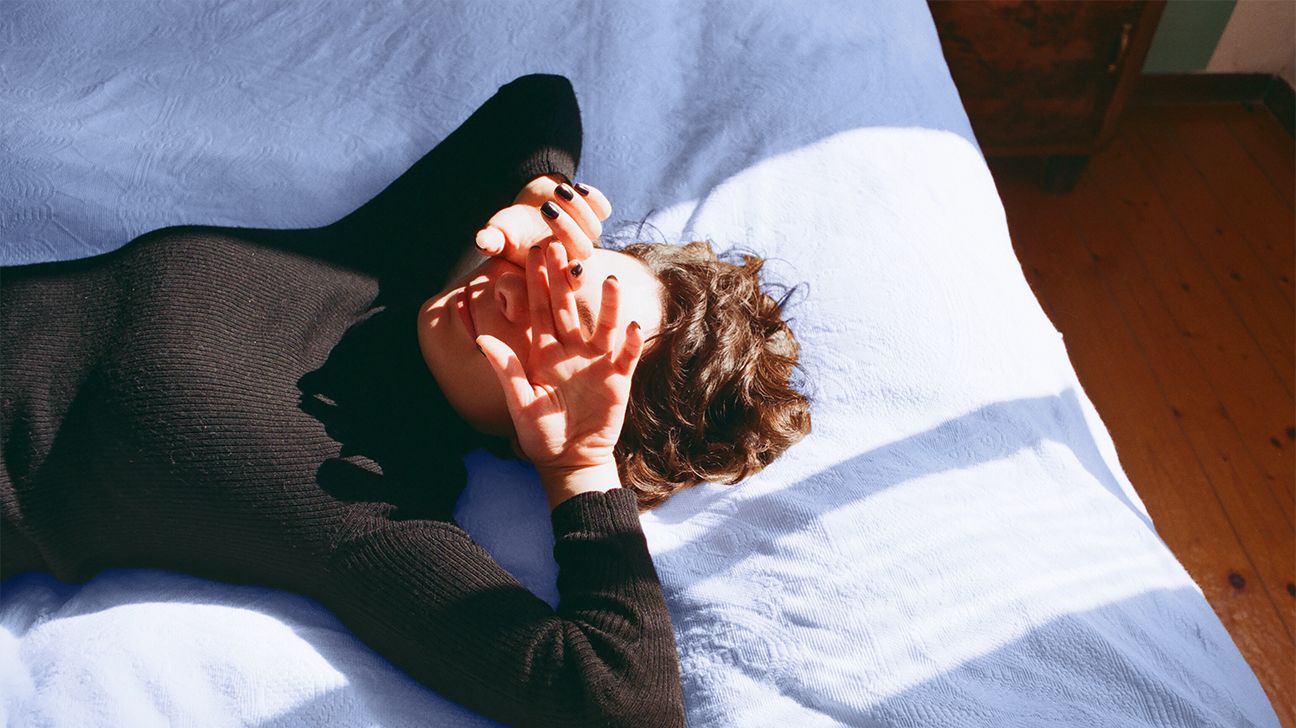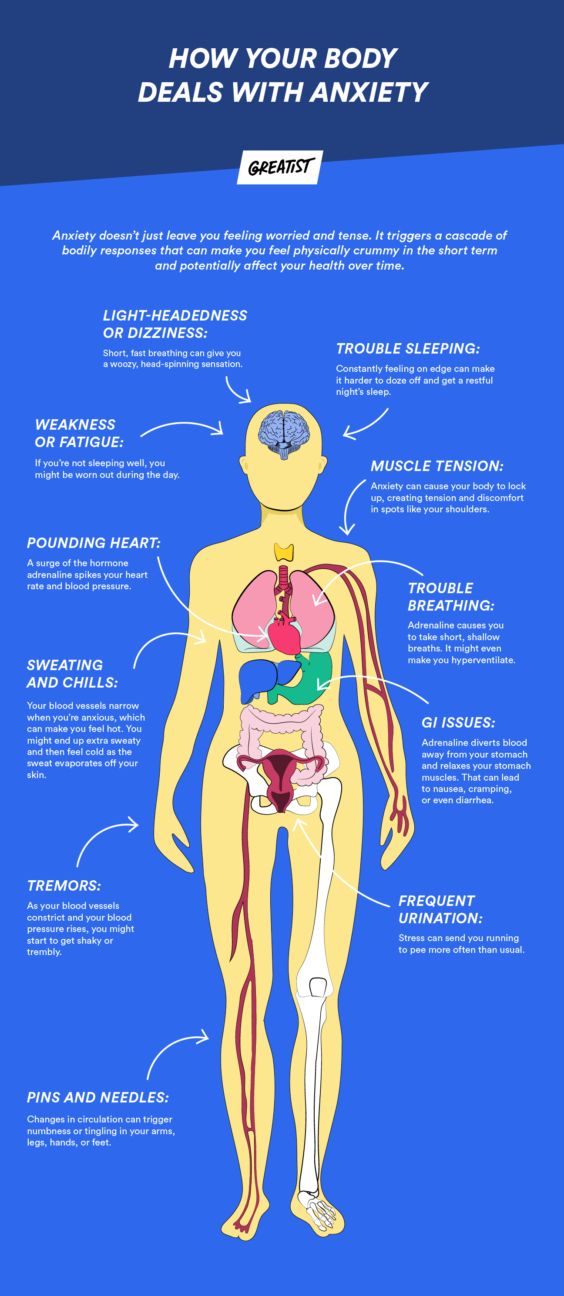Feeling anxious is sometimes part of life, especially these days. But at some point, everyday anxiety can morph into serious anxiety — the kind that can have a deep impact on your mental and physical health.
Anxiety is when you have tense or worried thoughts, often coupled with physical symptoms like rising blood pressure or a racing heartbeat.
If you’re among the 30 percent of U.S. adults who experience an anxiety disorder, you’re bombarded by these feelings pretty much all the time for weeks or months on end.
These disorders can take lots of different forms, including:
- generalized anxiety disorder
- panic disorder
- social anxiety disorder
- phobia-related disorders like agoraphobia
- separation anxiety disorder
It’s no secret that untreated anxiety disorders can take a major toll on your emotional well-being. But because anxiety triggers a cascade of physical symptoms, it can also have an impact on your body. And those effects could add up over time.
How exactly does anxiety affect you physically? Let us count the ways. When anxious emotions start to well up, you may also notice physical sensations like:
- increased heart rate
- faster breathing, or even hyperventilating
- sweating
- shaking
- light-headedness
- muscle tension, like clenching your jaw
- feeling weak or tired
- GI symptoms like nausea, cramping, or diarrhea
- having to pee more often
All in all, anxiety can have a pretty intense effect on your body. But what exactly is going on to make that happen? Anxiety is one of the brain’s ways of responding when it senses a threat.
In a dangerous situation (which can be legit dangerous or just something you perceive to be dangerous), the brain sends out a signal to flood the body with adrenaline to help protect yourself. Your heart rate and blood pressure go up, which can cause you to sweat, shake, or even feel tingly or weirdly chilly.
Blood flow is diverted away from your abdominal organs up to your brain, where it’s needed to help you move and think quickly, so your stomach gets that weird, something-bad-is-going-to-happen feeling. As you become hyperaware of your surroundings, your muscles start to tense up.
All in all, your body is ready to fight. But in the case of anxiety, there’s not really anything threatening happening. So instead of diving in and taking action to protect yourself, you’re just stuck with all of these awful feelings.
| Symptoms | Anxiety attack | Panic attack |
| worry and distress | ✓ | |
| restlessness | ✓ | |
| fear | ✓ | ✓ |
| sudden fear of death | ✓ | |
| feeling of detachment from the world or yourself | ✓ | |
| increased heart rate or racing heartbeat | ✓ | ✓ |
| chest pain | ✓ | ✓ |
| shortness of breath | ✓ | ✓ |
| feeling of choking or throat tightening | ✓ | ✓ |
| dry mouth | ✓ | ✓ |
| sweating, hot flashes, or chills | ✓ | ✓ |
| trembling, numbness, or tingling | ✓ | ✓ |
| nausea or stomach pain | ✓ | ✓ |
| headache | ✓ | ✓ |
| light-headedness or dizziness | ✓ | ✓ |
Panic attacks are particularly intense periods of anxiety, and differ slighty from anxiety attacks (take note of the chart above!).
They can come on fast, sometimes seemingly out of nowhere, and peak within 10 minutes or so, like a wave crashing over you. They’re usually marked by physical symptoms like:
- pounding or racing heart
- sweating
- shaking
- feeling short of breath, like you’re choking or being smothered
- chest pain
- nausea or cramping
- feeling dizzy or faint
- chills or suddenly getting very hot
- numb or tingling sensation
The feelings can be so strong and scary that some people mistake them for a heart attack or another condition that needs emergency medical attention.
If you find yourself in the middle of a panic attack or anxiety attack, follow these steps to calm down. If you’re experiencing intense anxiety, we’ve got you too — try these 13 tips for coping and calming.
Anxiety disorders are super common, so it’s normal to wonder whether the anxious feelings you’re dealing with are just a typical, temporary thing or a problem that needs to be addressed.
Anxiety tends to fall into disorder territory if it’s overwhelming enough to interfere with your everyday life. You might have generalized anxiety disorder if:
- You’re constantly worried or on edge.
- You’re overwhelmed by fears that you know deep down don’t make sense, but you can’t get them off your mind.
- Your anxiety causes you to avoid everyday situations or responsibilities like socializing or going to work.
- You’re anxious to the point where you aren’t enjoying life.
- You use drugs or alcohol to feel less anxious.
- Sometimes your heart starts pounding, seemingly out of nowhere.
Symptoms of generalized anxiety disorder will last for weeks or months without easing up, and they can creep into every area of your life. If you think that you might be affected, contact a mental health professional. Together you can take a look at your symptoms and decide on next steps.
Anxiety disorders need professional treatment, so if you suspect that you have one, you should see a mental health expert. Depending on your symptoms along with other factors, your therapist might recommend treating your anxiety with:
- regular talk therapy
- cognitive behavioral therapy (CBT), a form of talk therapy where you learn skills to cope with your symptoms and return to triggering activities you might have been avoiding
- medications like antidepressants or anti-anxiety meds, or in some cases, sedatives or beta-blockers
At-home techniques can also be helpful for coping, whether you’re diagnosed with an anxiety disorder or just find yourself feeling anxious from time to time. Some strategies that could be helpful:
- relaxation techniques like deep breathing, guided imagery, biofeedback, or self-hypnosis
- listening to music
- meditative movement, like yoga or tai chi
- taking care of yourself by eating well, exercising regularly, and getting enough sleep
Finally, try to keep things in perspective. Sometimes accepting that you can’t control everything — or even trying to find something positive or funny about an anxiety-inducing situation — can help you feel better about it.



